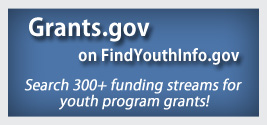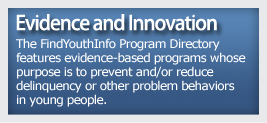Career Exploration and Skill Development
Finding a job can be a challenge for youth. They must determine what careers are available, what their interests are, and what skills they have or need to develop. Numerous resources are available to help youth get a sense of their interest and skills as well as gain employment experience and learn about employment opportunities.
(click “+” to see more details.)
Mentoring—matching youth or “mentees” with responsible, caring “mentors,” usually adults—has been found to be an important support for youth as they transition to adulthood and the workforce (Timmons, Mack, Sims, Hare, & Wills, 2006). Mentoring provides opportunities for youth to develop emotional bonds with mentors who have more life experience and can provide support, guidance, and opportunities to help them succeed in life and meet their goals (DuBois and Karcher, 2005).
Mentoring relationships can be formal or informal, with substantial variation, but the essential components include creating caring, empathetic, consistent, and long-lasting relationships, often with some combination of role modeling, teaching, and advising. One form of mentoring, called instrumental or topic-focused mentoring, focuses on a specific problem and aims at helping mentees reach specific goals, such as improving academic performance or preparing for employment opportunities.
Career-focused mentoring can take on a variety of forms and may focus on different pieces of career development and employment. Some examples include assisting with the following:
- Writing resumes and cover letters
- Conducting mock interviews and providing support for answering interview questions
- Exploring possible careers and assisting with job, internship, or program searches
- On-the-job skill development (soft skills or technical skills)
- Modeling behavior, attitudes, or skills in the workplace
- Career planning and goal setting (Timmons et al., 2006)
Apprenticeships and internships can provide on-the-job opportunities to integrate mentoring into employment experiences for youth. You can find out more about both apprenticeships and internships for youth below. Learn more about mentoring and the benefits for youth and their mentors.
Assessment, Testing, and Counseling
Self-assessments help to teach youth about themselves so they can find a career that is a good fit for their interests and skills. They allow youth to explore
- what they do and don’t like;
- how they react to certain situations;
- their skills; and
- their values (CareerOneStop Centers, n.d.).
There are many career assessments available. CareerOneStop Centers, which are supported by the U.S. Department of Labor, provide a range of resources, information, tools, and support for jobseekers under one roof. Information is provided both virtually and at sites across the country. These centers are able to conduct or access a variety of tests including basic education skills, the General Aptitude Test Battery, and other common assessments used in career and employment counseling. These assessments can also be conducted and supported through college career service offices or trade and vocational schools. The National Collaborative on Workforce and Disability provides a range of assessments that can help with the transition from school to employment. In addition to their focus on career planning, these resources recognize unique challenges faced by students with disabilities. An additional online resource, Students and Career Advisors, allows students, career advisors, and parents to learn more about potential career opportunities. This resource provides opportunities for students to explore their interests, learn about potential careers, learn how to get job experience, and find additional educational opportunities to support career development. Working with a professional, such as a counselor at a high school, trade or vocational school, college, or CareerOneStop Center can be helpful in selecting an appropriate assessment and interpreting the results.
Finding available jobs can be a challenge. It is important for youth to recognize that finding a job often takes time and it is important to develop a plan, schedule, and goals when conducting a search. There are many sources that list available jobs, from newspapers to listservs to online directories. CareerOneStop Centers have computerized job listings that provide information and knowledgeable staff are available to assist with counseling youth on various employment options. State vocational rehabilitation agencies are typically represented or can be accessed at CareerOneStop Centers to provide assistance for youth with disabilities in the job search process. College career centers can also provide valuable resources for students in searching for jobs and internships. Both college career centers and CareerOneStop Centers can also help youth to prepare their resumes, write cover letters, and practice interviewing. A number of resources can be helpful in finding available jobs and understanding how prior employment experiences lead to future opportunities. One example of this is My Skills My Future. This tool allows youth to search for career opportunities based on past employment experiences.
Soft skills are generally defined as personal qualities, not technical in nature, that translate to good job performance. They have been named by employers to be most important for successful job performance. Soft skills can be learned through a variety of means including classroom instruction, volunteering, and service-learning. Learn more about soft skills and how they can be developed.
Technical Skills and Job Training
Over 50 percent of manufacturers who completed the 2005 skills gap survey reported that technical skills were the skills that employees would need most in the workforce in the upcoming years (Deloitte, 2005). Vocational training courses or work-study programs can teach marketable technical or occupational skills. CareerOneStop Centers can provide training or make referrals to local post-secondary institutions and youth-serving agencies when training and other services are needed. Not only are the people there knowledgeable about these resources, but they also can approve vouchers to defray training costs. The Center for Employment Training (CET) is a non-profit organization that has partnerships with the Department of Labor. CET has pioneered the practice of open-ended, competency-based training that uses the workplace as the context for simulations. The individualized training allows youth to train at their pace and explore career options first-hand. The majority of training is provided through hands-on experience. The Office of Vocational and Adult Education within the U.S. Department of Education also provides support to states, schools, and community colleges to support technical and vocational education.
Apprenticeship programs grew out of the school-to-work movement and provide youth classroom instruction combined with structured on-the-job training with a mentor. The training is split between academic courses and vocational training while the on-the-job portion provides opportunities for practice in and understanding of work-based context for classroom instruction (Crosby, 2002). Youth apprenticeships can easily lead to admission to adult apprenticeship programs after graduation. The U. S. Department of Labor sponsors registered apprentice programs that meet its standards. The minimum requirement for participation in an apprenticeship program may vary by the skills demanded for the program, but to be eligible youth must be at least 16. Due to restrictions, some hazardous jobs are limited to individuals over 18. Participation in apprenticeships allows youth to receive the following:
- A paycheck: From day one, youth earn a paycheck guaranteed to increase over time as new skills are acquired.
- Hands-on career training: Apprentices receive practical on-the-job training in a wide selection of programs, such as health care, construction, information technology, and geospatial careers.
- An education: Apprentices receive hands-on training and have the potential to earn college credit, even an associate or bachelor's degree, in many cases paid for by the employer.
- A career: Once the apprenticeship is completed, youth are on their way successful long-term careers with competitive salaries and little or no educational debt.
- National industry certification: When an apprentice graduates from a career training program, he or she will be certified and can take that certification anywhere in the U.S.
- The opportunity to work with recognizable partners: Many of the nation's most recognizable companies, such as CVS/pharmacy and UPS, have Registered Apprenticeship programs.
Many states have State Apprentice Agencies with additional apprentice programs. For an example of a state program, visit Wisconsin Department of Workforce Development: Youth Apprenticeship Program Information.
The Office of Disability Employment Policy (ODEP) provides a toolkit and other resources to increase the capacity of programs to provide integrated inclusive apprenticeship training to youth and young adults with a full range of disabilities, including those with the most significant disabilities. ODEP also provides guidance on how to utilize the increased flexibilities in the Department of Labor apprenticeship regulations.
Internships, both paid and unpaid, provide youth with short-term, practical experiences to learn about careers, develop networks, and experience the workplace. Internships are available in a diverse array of career fields and can be formal or informal. Internships provide youth with opportunities to explore what they like and do not like about certain careers. They allow youth that might not know what career they want to pursue with a chance to see if a certain environment, job, management style fits their needs. Both on-the-job experience as well as the application process allow youth to develop skills so that they are able to enter the job market with relevant career experience. According to a 2005 survey by the National Association of Colleges and Employers, 60 percent of employers hire college graduates who had completed internships. Further, on average over half of the students who completed internships were offered full-time positions upon internship completion (Jones, 2006).
CareerOneStop. (n.d.). Why learn about me? Retrieved from http://www.careeronestop.org/ExploreCareers/SelfAssessments/WhyLearnAboutMe.aspx
CareerOneStop. (2011). My skills my future. Retrieved from http://myskillsmyfuture.org/
Crosby, O. (2002). Apprenticeships: Career training credentials - and a paycheck in your pocket. Retrieved from http://www.bls.gov/opub/ooq/2002/summer/art01.pdf (PDF, 20 pages)
Deloitte Consulting LLP. (2005). 2005 skills gap report – A survey of the American manufacturing workforce. Retrieved from http://www.doleta.gov/wired/files/us_mfg_talent_management.pdf (PDF, 32, pages)
DuBois, D. L. & Karcher, M. J. (2005). Youth mentoring: Theory, research, practice. In D. L. DuBois & M. J. Karcher (Eds.), Handbook of youth mentoring (pp. 1-13). Thousand Oaks, CA: Sage Publishing.
Jones, E. (2006). Internships: Previewing a profession. Occupational Outlook Quarterly. Retrieved from http://www.bls.gov/opub/ooq/2006/summer/art02.pdf (PDF, 3 pages)
National Collaborative on Workforce and Disability. (n.d.). Assessments. Retrieved from http://www.ncwd-youth.info/topic/assessment
Timmons, J., Mack, M., Sims, A., Hare, R. and Wills, J. (2006). Paving the way to work: A guide to career-focused mentoring for youth with disabilities. Washington, DC: National Collaborative on Workforce and Disability for Youth, Institute for Educational Leadership. Retrieved from http://www.ncwd-youth.info/assets/guides/mentoring/Mentoring_Guide-complete.pdf (PDF, 124 pages)
U.S. Department of Labor (n.d.). Apprentices. Retrieved from http://www.doleta.gov/oa/apprentices.cfm
U.S. Department of Labor. Office of Disability Employment. (2011). Disability employment policy resources by topic: Youth in transition apprenticeships. Retrieved from http://www.dol.gov/odep/topics/youth/Apprenticeship.htm
Resources
Kids.gov
Kids.gov is the official kids' portal for the U.S. government. It links to over 2,000 web pages from government agencies, schools, and educational organizations, all geared to the learning level and interest of kids. Specifically, Kids.gov provides information and descriptions of different careers so youth can learn more about available opportunities. Separate information is targeted at youth in grades K-5 and youth in grades 6-8. There are also resources for youth-serving professionals and educators.
Youth-Focused Job Links from the U.S. Department of Labor
The U.S. Department of Labor’s Employment and Training Administration provides links to a range of free online resources and Department of Labor resources for youth to help them develop career plans.
CareerOneStop Centers
Youth are served within the Department of Labor’s CareerOneStop Centers. These centers are funded under WIA and help both adults and youth explore careers, search for jobs, develop interviewing skills, receive education and training and write resumes. Centers are located in communities across the U.S.
Occupational Outlook Handbook, 2010-11 Edition
The Occupational Outlook Handbook is a nationally recognized source of career information from the U.S. Department of Labor, Bureau of Labor Statistics. It is designed to help individuals making decisions about their future work lives. The handbook is revised every two years. It includes information on hundreds of jobs and describes the training and education needed, earnings, expected job prospects, what workers do on the job, and working conditions. In addition, the handbook gives job search tips, links to information about the job market in each state, and more.
Career Guide to Industries, 2010-11 Edition
The Career Guide to Industries, a companion to the Occupational Outlook Handbook, is a publication from the U.S. Department of Labor, Bureau of Labor Statistics. The guide provides information about a range of industries including educational services, healthcare, and motor vehicle and parts manufacturing. The guide lists occupations available in the different industries, training and advancement, earnings, expected job prospects, and working conditions. In addition, the Career Guide provides links to information about the job market in each state, and more.
Occupational Safety & Health Administration Young Workers
This site provides safety and health information for young workers and their parents, employers, and educators. It answers questions often asked by working teens. Details about workers' rights, links to training, information about state youth employment laws, and other educational tools may also be found here.
Office of Disability Employment Policy
The Office of Disability Employment Policy (ODEP) was authorized by Congress in the Department of Labor's FY 2001 appropriation. ODEP works to influence national policy and promote effective workplace practices to ensure that todays—and tomorrows—workforce is inclusive of all people, including people with disabilities. ODEP provides a range of resources and information for youth with disabilities transitioning to adulthood. This includes a focus on soft skills, apprenticeships, a blog, and data, among others.
My Skills My Future
As a CareerOneStop website, this tool allows youth to search for jobs based on a past employment experience. The website suggests related career opportunities and allows youth to learn more about the different types of careers available.
National Collaborative on Workforce and Disability
This website, supported by the U.S. Department of Labor's Office of Disability Employment Policy (ODEP), provides a range of information on youth employment including assessments that can help with the transition from school to employment. The website pays specific attention to youth with disabilities.
Students and Career Advisors
This tool from the CareerOneStop center allows students, career advisors, and parents to learn more about potential career opportunities. It provides opportunities for students to explore what their interests are, learn about potential careers, learn how to get job experience, and find additional educational opportunities to support career development.
Disability.gov: Employment
This section of Disability.gov has a wealth of resources that are searchable by subtopic, audience, location, and disability type. Subtopics include resources on career planning, places to search for a job, accommodations and supports on the job, mentoring and internship programs, self-employment and small business ownership and more. It also provides information about preparing youth for employment and includes specific audience types for students, children and youth, parents and guardians, caregivers, teachers, and more.
Disability Employment 101
The Office of Special Education and Rehabilitative Services within the Department of Education has released and updated its Disability Employment 101 guide. This guide provides information about hiring employees with disabilities, including information about how to find qualified workers with disabilities, how to put disability and employment research into practice, and how to model what other businesses have done to successfully integrate individuals with disabilities into the workforce.
Youth Topics
Collaboration Profiles
Feature Articles
Tools & Guides
Programs
Technical Assistance
Websites
Publications
Videos & Podcasts
Data Sources


Announcements

Map My Community is a tool designed specifically to assist you in locating resources in your community to help you build and strengthen your youth program. Get ideas for new partnerships, identify gaps in your community, and learn about resources to avoid duplication of effort.



















